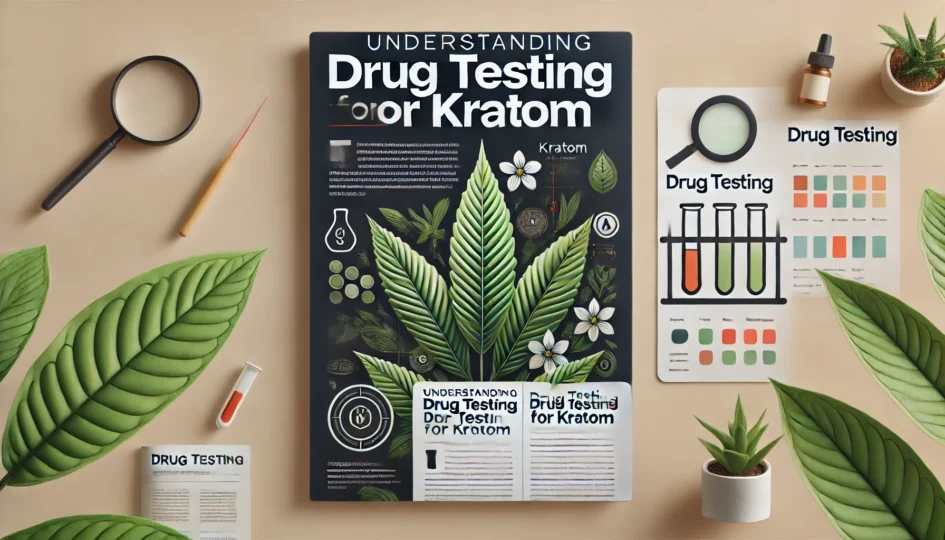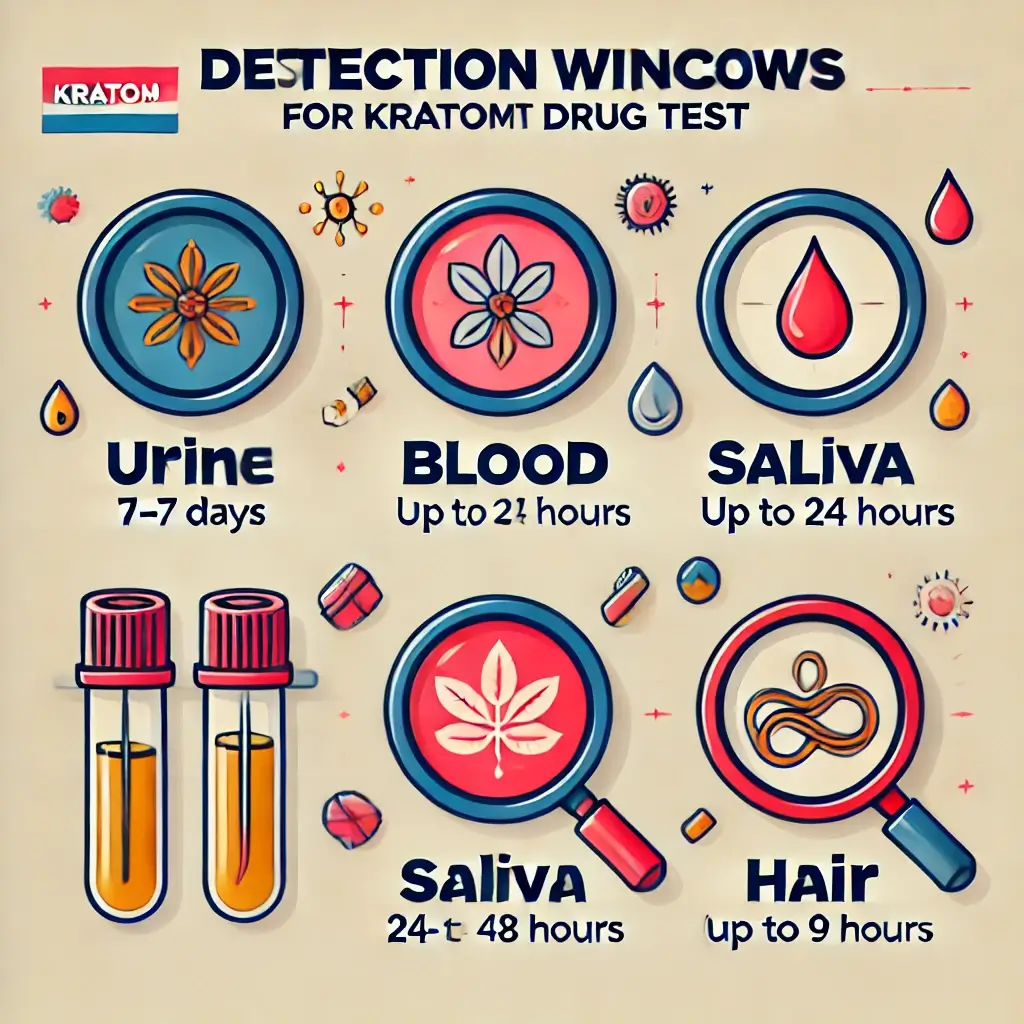Kratom has gained popularity as a natural remedy for various ailments and a stimulant for energy and focus.
However, with its increasing use, many avid kratom users have raised concerns about whether kratom can be detected in standard drug tests.
Understanding the intricacies of drug testing for kratom is essential, especially for those who might be subject to routine screenings for employment or other reasons.
What is Kratom and Why Would It Be Tested?
Kratom, scientifically known as Mitragyna speciosa, is a tropical tree native to Southeast Asia.
Its leaves contain compounds that can produce stimulant and sedative effects.
The primary active ingredients in kratom are mitragynine and 7-hydroxymitragynine, which interact with opioid receptors in the brain, producing pain relief, euphoria, and increased energy.
Even though we see kratom as a useful supplement, others consider it a drug.
If you are getting ready for a drug test, it’s safe to question if kratom will fail you.
Types of Drug Tests
Before diving into whether kratom can be detected in drug tests, it’s important to understand the types of drug tests commonly used:
- Urine Tests
The most common form of drug testing, primarily used in employment screenings. These tests can detect drug use within the past few days up to a week.
2. Blood Tests
Less common and more invasive, blood tests can detect substances in the bloodstream and are usually used in medical settings or for legal purposes.
3. Saliva Tests
These are used to detect recent drug use, typically within the past 24 to 48 hours.
4. Hair Tests
These tests can detect drug use over a longer period, up to 90 days, and are used less frequently due to their cost and complexity.
Standard Drug Tests and Kratom
Kratom is not commonly included in standard drug testing panels.
Typical drug tests screen for substances such as:
- Marijuana (THC)
- Cocaine
- Amphetamines (including methamphetamine)
- Opioids (including heroin, codeine, and morphine)
- Phencyclidine (PCP)
Since kratom’s active compounds are not chemically similar to these substances, they are not typically detected by these tests.
Specialized Kratom Testing
While kratom is not detected in standard drug tests, there are specialized tests designed to identify its presence.
These tests specifically look for mitragynine and 7-hydroxymitragynine.
However, these tests are not commonly used due to the following reasons:
- Cost
Specialized testing is more expensive and less likely to be employed by employers or routine screenings.
2. Awareness
There is limited awareness and understanding of kratom among employers and testing agencies, leading to a lower likelihood of including it in drug tests.
3. Legality
Kratom’s legal status varies by region, and in many places, it is not considered a controlled substance, reducing the incentive to test for it.
Scenarios Where Kratom Testing Might Occur
While uncommon, there are certain scenarios where testing for kratom might occur:
- Medical Settings
If a healthcare provider suspects kratom use and it’s relevant to the patient’s health or treatment plan, they might order a specific test.
2. Legal Situations
In cases involving drug use allegations, child custody disputes, or probation conditions, specialized testing might be ordered.
3. Workplace Policies
Certain industries with strict drug-free policies, such as transportation or federal employment, might adopt comprehensive testing protocols that include substances like kratom.
Detection Window for Kratom on Drug Tests
For those who might be subject to specialized kratom testing, understanding the detection window is crucial:
- Urine: Kratom can be detected in urine for about 5 to 7 days after use.
- Blood: Kratom’s compounds can be detected in the blood for up to 24 hours.
- Saliva: Kratom can be detected in saliva for approximately 24 to 48 hours.
- Hair: Kratom use can be detected in hair for up to 90 days, but hair testing for kratom is extremely rare.
Factors Influencing Detection
Several factors can influence how long kratom remains detectable in the body:
- Dosage and Frequency: Higher doses and more frequent use can extend the detection window.
2. Metabolism: Individuals with faster metabolic rates may process and eliminate kratom more quickly.
3. Age and Health: Older individuals or those with certain health conditions might process kratom more slowly.
4. Body Fat: Since kratom’s compounds are fat-soluble, individuals with higher body fat percentages might retain kratom longer.
Preparing for a Drug Test if You Are A Kratom User
If you are a kratom user facing a drug test, here are some tips:
- Know Your Rights
Understand your rights regarding drug testing in your region or workplace. Some places require consent before testing or have specific guidelines on what substances can be tested.
2. Disclosure
If you believe kratom use might be relevant, consider disclosing it to your employer or testing agency, especially if it is for medical purposes.
3. Detoxification
While not always necessary, some users opt for detoxification methods to eliminate kratom from their system. Staying hydrated, maintaining a healthy diet, and exercising can help speed up the elimination process.
4. Consult a Professional
If you have concerns about kratom use and drug testing, consulting with a healthcare professional or legal advisor can provide personalized guidance.
Kratom Drug Testing In Conclusion
While kratom is not commonly tested for in standard drug panels, specialized tests do exist.
Avid kratom users should stay informed about the potential for testing in specific scenarios and understand the factors that influence detection.
By knowing your rights and taking appropriate precautions, you can navigate drug testing with confidence and peace of mind.
Frequently Asked Questions About Kratom and Drug Testing
Q: Can standard drug tests detect kratom?
A: No, standard drug tests do not typically detect kratom.
These tests commonly screen for substances such as marijuana (THC), cocaine, amphetamines, opioids, and PCP.
Kratom’s active compounds, mitragynine and 7-hydroxymitragynine, are not chemically similar to these substances and therefore are not included in standard drug testing panels.
Q: Are there specialized tests for detecting kratom?
A: Yes, there are specialized tests designed to detect kratom.
These tests specifically look for mitragynine and 7-hydroxymitragynine.
However, such tests are not commonly used due to their higher cost, limited awareness among employers and testing agencies, and the varying legal status of kratom in different regions.
Q: How long can kratom be detected in the body?
A: The detection window for kratom depends on the type of test used.
In urine, kratom can be detected for about 5 to 7 days after use.
In blood, kratom’s compounds are detectable for up to 24 hours.
Saliva tests can detect kratom for approximately 24 to 48 hours, while hair tests, though extremely rare for kratom, can detect use up to 90 days.
Factors such as dosage, frequency of use, metabolism, age, health, and body fat can influence how long kratom remains detectable in the body.
Q: Where can I buy high-quality kratom?
A: Click here to shop Motark’s selection of the finest third-party tested kratom available!






Leave a Reply